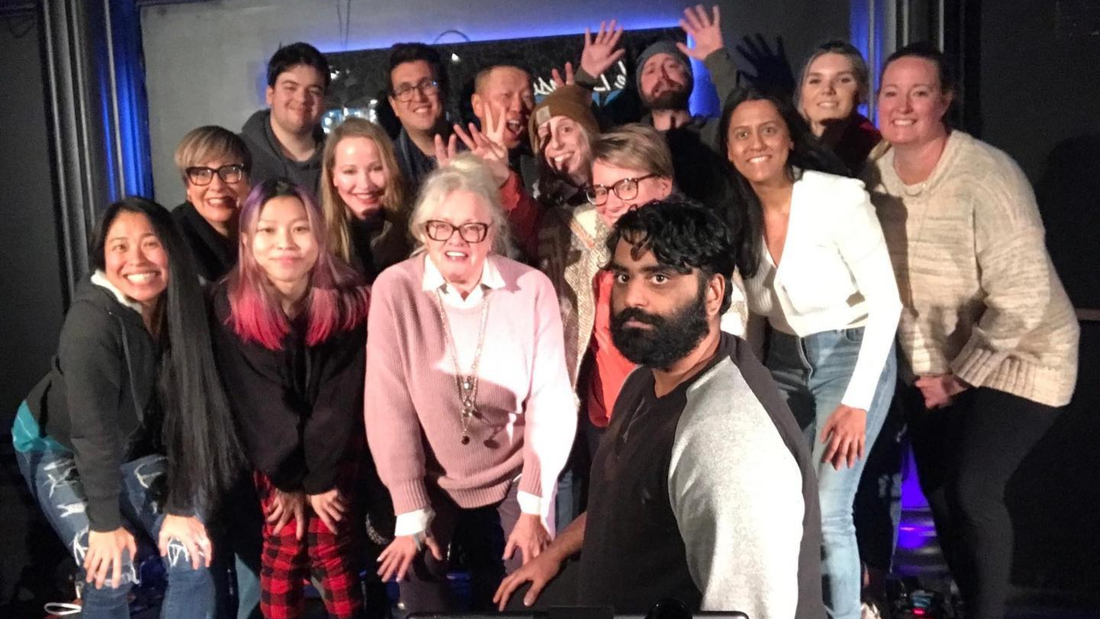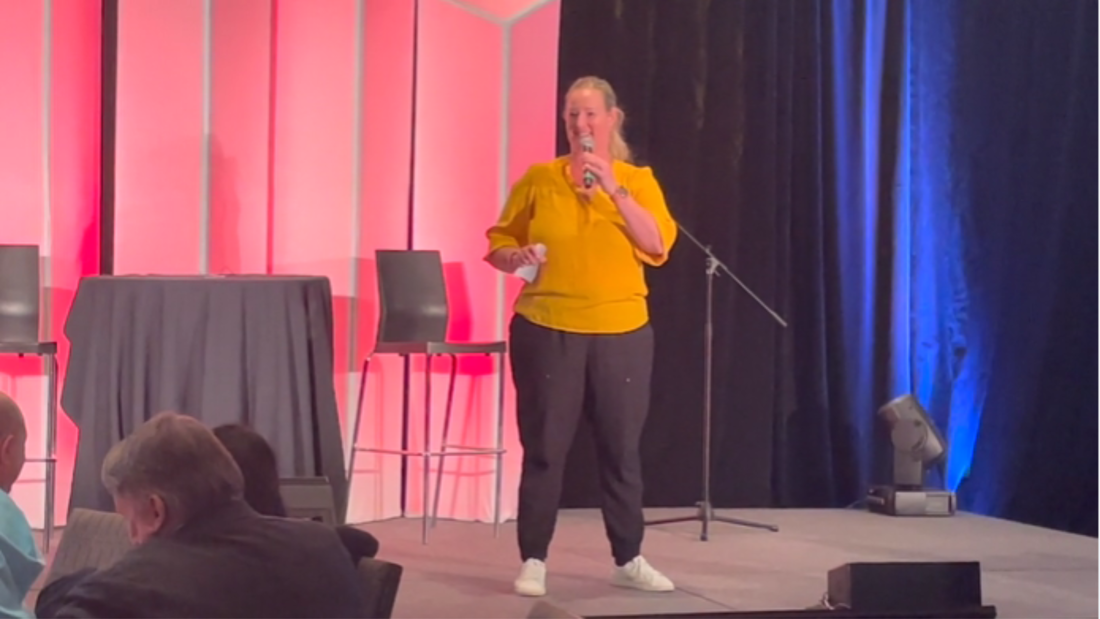|
Have you been feeling like you've lost motivation for something in your life and you just want to find it again? If you had motivation in the past and you don't have it now, I'm going to share a little bit more about how I got fired up again for soccer. There are a lot of pieces to this, but I will really bare my soul in my soccer journey. My soccer story I have played many sports over the years: basketball, volleyball, track and rugby. But soccer since I was very, very little. I have played indoor and outdoor soccer with all girls and some co-ed. I played all year long. I played in school, in house league, and select then I moved into playing rep. I was captain a lot except when I was a teenager and moved up to play on an open women’s team. I played in a lot of tournaments, often one every weekend of the summer. The list goes on - and I still play today. I had injuries over the years with sprained ankles and was able to spring back, but after tearing my ACL playing rugby, getting it repaired, and having two children it was harder. There are a lot of physical obstacles that I've had to face including plantar fasciitis, back issues, my knee being weak and a Covid cough that has lasted seven months. I’m sure you've also had to face obstacles (not just sports related). It could be in your business, marriage, or house. This can cause you to lose motivation for some reason or another. About 13 years ago, I moved from a highly competitive league into a league that's just recreation, caused me to lose my motivation a little bit because I didn't have to try that hard to do well. Even after kids, I could still get away with not being super fit and not doing too much because the players aren't as good. Well, I’m now 43, had two kids, and I'm now probably carrying around about 50 pounds of extra weight that makes it hard. But what caused me to fee like giving up? As I mentioned, over the past few years I’ve had multiple injuries - ankle, knee, and back injuries - that then cause something else. For example, just as my ankle gets fixed, it would cause something else like a sore knee or back. Then I get over that and sprain my ankle just walking down the sidewalk. I cried. I cried not out of pain, but I cried out of frustration. I thought, “What is the point?” Then just as I am physically not injured anymore, I get COVID. With that first bout of COVID, I had the COVID cough for probably eight weeks, and because of how intense the restrictions were, I couldn't get any support from doctors because I wasn't allowed. You know how it is, right? You have to fill in the form, and if you say you're coughing, then you can't get an appointment. I couldn't get help. I wasn't really able to be on the soccer field because I'd be coughing. People would look at me like I shouldn't be there. So I finally get over that, and then I came back and I get injured again. You can just imagine how the story is, and I'm super frustrated. I've lost motivation because I feel like, “What's the point?” Maybe I'm done. Maybe I'm not going to do this anymore. But I’d miss out. Now how about you think about something you need motivation on? What are you missing out on because you’re not doing what you want to do? What I was missing out on was that competitive side, the athlete, the confident person who loved to play soccer, but also the social side of things. It killed me to just go and sit on the sidelines because I could see all my friends out on the field, and they were enjoying themselves and I wasn't participating. I lost motivation. Not even just motivation for soccer, but the motivation for me to be healthy again because I also had a second bout of COVID and the cough has still not left after seven months. It's made all of these comebacks super hard. Have you felt that? You come back from something. You're getting back into business, you go into that next level, it's a struggle. I've struggled and it's hard to get fit if you're always injured. It's hard to lose weight if you can't exercise. It's just this vicious cycle. It’s hard to be energetic if you’re coughing all of the time. How I get fired up again for soccer The motivation was not coming internally from me. It wasn't intrinsic, I really needed to have some sort of external motivation to push me. It shouldn't be surprising what it was, but it really, really positively impacted me. I loved the girls on my team and we played well together, but I knew I needed to change teams. What I was missing was a coach, practices, and full warm-ups. Now that I am on a new team that has a coach, I've really seen how this has increased my soccer brain and it’s causing me to up my game. The external motivation has helped to increase my inner motivation. The question to ask yourself about your situation is, “What do I need that can externally motivate me until I can get my internal motivation back?” Maybe it’s a coach. What a good coach will do for you
I feel like I'm playing at about maybe 25% of my ability, which is super frustrating because I'm very competitive, and I'm A-type driven and I can't do as well as I have been. I'm also a recovering perfectionist. When I can't do really well, it frustrates me. But I've given myself a lot of grace. What the coach has done for me is give me positive feedback:
That has helped me a lot to feel like I'm a valuable member of the team and that I matter. Maybe in your life in some area, you don't feel like you matter. Maybe you are coming to grips with that feeling of “My effort isn't important” or you don’t feel “enough”. Having positive feedback from him has caused me to feel okay again. It's one thing that I'm not as good as I was before, and I'm getting better, but to hear that you're seen as something positive really pushes you to step up, and step into what other people see for you. You could find this in a friend, a mentor, an expert to support you with something, in an accountability partner, or coach. Having an outside person to give you positive feedback is so helpful. Yes, I still receive constructive feedback, but the positive feedback holds more weight. I've really appreciated that in sports my whole life, probably the greatest gift my mom gave me was believing in me, which really built up my self-esteem, and built up my confidence. It makes me want to participate more. We want to participate more in something we do well, right? 2. A coach will see your potential and tell you what you need to hear, not just what you want to hear I have always been at the top of my game in sports. I have always been the top player or one of the top players. I've always been looked at as the key to the team’s success. I haven't felt like that for a long time, and it's more like I’m a detriment to the team. My coach created a new position on the field for me. It's so great because I have been a center mid and over the years based on my injuries, lack of fitness and such I had to move to the defense. But then I was really struggling and coughing during the games and struggled to do the position properly. So he made a new position for me. When someone external sees YOU and your potential, they can suggest you try something new or do things differently. It can give you a new spark. It was so great. I loved the new position. “If this isn’t working for you, then how about this?” That's something that a coach, mentor or someone else can do for you. They can look at what’s not working or what the obstacles are and give a suggestion. What wasn’t working was me pivoting quickly and being able to race back. What is working is him pushing me forward. It’s so beneficial to have someone externally see things differently and offer a suggestion because you might have blinders on. I totally did have blinders on. I thought I needed to play defense. That I needed to hold that ground. But we had two other players who can really step up in that position, and then I could move forward, which is so good. Actually, it was so exciting. So I have this new fire in me. Rather than rebuilding the same fire, it was a new fire. I’m really thoroughly enjoying this position. 3. A Coach will expect more from you That's something I think everyone needs in their life. Somebody who will say, “Okay, you're here, so let's get you there.” Not “Let's get you all the way to the goal right now”, but “Let's get you one step closer”. They hold you to a higher level, but the higher level only needs to be 1% better tomorrow than today. It doesn't need to be 200% better. I am not going to be this phenomenal, top MVP player tomorrow. But could I be better tomorrow than I was today? For sure. Wrapping Up I hope you can look at that one area you want more in and be honest, “I need motivation, and I want to make things better.” I encourage you to find someone who will give you positive feedback, find someone who will see you and speak into the things that you need to hear, and someone who will hold you to that higher level. Someone who will hold you accountable to show up and hold you accountable to do what needs to be done. I hope you are able to regain motivation wherever it is missing in your life, and get fired up again. If you want to have a conversation about this to see how I can support you, I’m happy to do that. I do offer free 15-minute consults to just see if we’re fit - just email me and let me know a little more [email protected]. Read my other blogs here:
0 Comments
Are you thinking about making a big decision, but you’re hesitating for any reason or you think it’s hard? Recently, I've had a few clients come to me with some big decisions they have to make. Some of them are about their career and some are about moving. Since they’re about different areas of life, it made me think about the trouble with big decisions and how we come to this place of having to make a decision on a new career, where to live, or a relationship. It's overwhelming wondering, “What decision do I make?” or “Do I make this or that decision?” You often have only two options. But sometimes, there are so many decisions, and then each of those choices comes with dozens of options which makes decision-making so hard. Today, I'm going to talk about the three stages to making these big decisions. Then I'll share a little bit about how to do well at each stage. Stage 1: Change Stage When you have a big decision, it is often putting you in the first stage, which is the change stage. For example, you are looking for your first job, you've just left a job, you were fired from a job, laid off from a job, or you're thinking about what new career you should have. You may have lots of emotions like grief, disappointment, anger, frustration, or if you are moving into a career change, there might be some excitement, overwhelm, fear, or feeling like, “Finally, I'm here. Finally, I get to make the decision for myself.” Check in first with your emotions: “How do I feel here? What is the change I've experienced” Then give yourself some time to be in this stage because if you're holding resentment, anger, fear or whatever it may be, you might have to work through that before getting into the next two stages, or at least to keep this stage and these feelings in mind as you go into the next two stages. For example, if you got laid off or were fired from a job, you might have that anger. You also might have hesitation in “Am I good enough for this next career?” What we really want to do is make sure you're self-aware in this stage so you can really feel and know what's happening to yourself, and then honor it. This might mean you do some sort of ritual or ceremony to show you are leaving that behind and moving forward. I often talk with clients, and we decide on something like writing a letter and then ripping it up and burning it. I encourage you to do this in a space that is safe and free to do it or in a fireplace. If you can, some people will then take the ashes and pour them in water. A really cool idea came up once about going out in low tide and writing a message in the sand and then having the waves come and wash it away and maybe be witness to that. If you're going to do one of these cleansing or letting go ceremonies or rituals, then I encourage you to have something fun to enjoy after. One example of this is if it’s summer and you decide to do it at the beach, maybe you go into the water as the fun part at the end or you have a barbecue at the beach with your friends after. Another thing you could do is go to the spa and be treated to some self-care. Maybe it's a massage, acupuncture, a facial, some time in the sauna so that there is some taking care of self that happens afterwards. In this change stage where you have some feelings, some strong feelings, just make sure you give yourself some time to intentionally do something to help you release them. Maybe you get some counseling, you know yourself best. Once you've dealt with the feelings and emotions, give yourself some space because if you were working really hard, then you need a little bit of a break, take that much-needed break and recharge because no one wants to make a big decision, feeling tired, or feeling hesitant or feeling scared. Stage 2: Exploration Stage The next stage is the exploration stage. I can remember when a man came to me, he had just sold a business (with his two friends) that brought them 75 million to split. At the time that I was talking to him, he didn't know what he wanted to do with his life in his early 30s. With all that money he could do whatever he wanted. He was feeling pressure because he just had a major win and a big success. He felt pressure to take on another business or to invest the money in something. I said to him in a session, “You're in the exploration stage. There is no way that you can make that big decision right now. You need to find the information.” In the exploration time, you have complete permission to just check things out, to learn, to research, to do information interviews with people who have a career you want or who've done what you want to do. While this is happening, I want you to make sure that you're exploring ideal options. Not things that have you settling. If you say, “Oh, that seems ok for me.” or “I think I can do that.” We need to be thinking about what's ideal. Brainstorm without the thought of reality. Brainstorm without that idea of, “How am I going to make this happen?” Ditch all the how-tos and listen up for any limiting beliefs, saboteurs, negative self-talk, or anything that pops up that is going to inhibit you from coming up with all the ideas. A lot of times in this stage when I'm helping my clients brainstorm, they have blinders on. They're not seeing options to the side of them. Sometimes they've got an opportunity so close to them that they don't see it. They're trying to look for something bigger, better, or different when they have the most ideal answer right in front of them. It's really a good idea in the exploration stage to have someone else that you're talking with about it. It can be a coach or a counselor. It’s still important to do research and information interviews, but having someone to sit with you to make sure you’re looking at what's ideal is crucial. They will make sure you don’t succumb to those limiting beliefs. Exploration is just that. It's time to explore different options. When I did this stage just recently with some clients, I asked, “What are all the ideas or the options you have for this decision? Okay, now, let's look at each one. How does it look? How does it feel? How much do you like it?” Getting those ideas from them, getting the truth of where they're at with it, and at the same time I'm listening for limiting beliefs and resonance (positive energy). It helps us to get to a place to make a good decision. It sounds like this, “I've got four options. These two aren't for me right now. They're maybe a long-term plan. The first two can help me get where I want to be. Which is the best choice?” I always look at the Wheel of Life as well. Sometimes my business clients say, “Oh, if I'm coming to you for business coaching, why am I looking at my wheel of life?” Well, the key thing with any decision you make, we want to make sure is in alignment with what's ideal for your future and what's ideal for every single area of your life. For example, in your business, if you want to do something quite physical that demands a lot of traveling from you, yet in another area of life, you really want to have a child or you want to move away from family, which is causing you to then lose your built-in support system, is that going to be good and help you or hinder you in doing that job that is very physical or doing that career that has you travel a lot? You always want to make sure that different areas of life are still honored while you go forward and take action on these big decisions that you have to make. Stage 3: Action This is the third stage: action. You’ll now want to take action on some of the options. It might not be the decision you end up with, but you have to take some action towards it to figure that out. When you have options A, B, C, and D, if B is the choice, what's the first step that you can take? The first step might be:
You need to think about:
Again, having someone on your side at this stage is really helpful because in talking about the action, they're going to help you to come up with what really is the first action. There might be 10 actions that you could take, but one of them is the right one for now. You also want to choose the one that is 150% something you're going to do because if it's not 150% that you're going to do it, then it's too big, it's overwhelming, or the limiting beliefs will come into play. Wrapping Up In making big decisions, there are three stages: Change Stage, Exploration Stage, and Action Stage. If the action stage tells you, “Oh, option B was actually not the best option. Maybe I want to try a different option now or I want to go back through the stages, you're allowed to do that. Just because you made that decision in November, and you realize by January, you made the wrong decision, you don't need to continue with it if it's not the right one.” It's not always about picking right the first time. It's seeing where you're off course to where you really want to be, and then making the decision to come back to something that is better. Since we can make a new discovery later on, with more insight, more knowledge, more skill potentially, more connections, more of a network, we only then realize, “Oh, this isn't the right one for me.” You have the experience of it, so you then get to remake your decision based on this new exploration stage or information that you've come up with. I hope that you will ask yourself, “Where am I in making a decision? Am I still in the place of needing to make changes and changing my emotion? Am I in that place of exploration? Or am I ready to take action? I do encourage you if you have the Dynamic You book to look at the five stages of change that I explained about in there. It'll also help you to know which stage you are in so you know how to move through those five stages of change. P.S. Here’s a decision you might need to make at the moment, deciding to register for the Dynamic Women Online Summit 2023! We’ll be pulling back the curtain to share how to be a more dynamic woman, and how to optimize opportunities, so you can reach your goals more easily and quickly. Grab your FREE or VIP tickets today! Read my other blogs here:
Have you done something new? I did! I tried something new last year - stand-up comedy! It’s something I’ve always wanted to do, but when I first saw an online class for it, it was only a month after my dad passed away. I wanted to honor my grief first. I also didn’t want to cry on stage when delivering my set. After two and a half years, I finally joined. It was perfect timing. It was a five-week comedy class, and then we did an actual set in front of around 100 people! A couple of days after that, I did another set but in front of other speakers at the Canadian Association of Professional Speakers Conference in Calgary! It was a wonderful experience. As I go through the five things I learned from my stand-up comedy class, think of something you’ve done that's new. Or maybe think of something you're wanting to do. My hope is you'll learn something from these and it’ll help you to have more success and an easier time. #1 - You’re not as good as you think I think I’m a humorous person. I like to think I tell really good stories, that I'm quick-witted and can pop in little comments and make people laugh. I definitely can do that. I thought, “Ah, I'm going to go and do stand-up, and I'm going to be awesome. I'm going to be so good.” Yeah, I'm not a stand-up comedian. That's what I learned pretty quickly. If you've watched someone do something, and you're like, “I can do that.” Don't say that until you actually try it. Stand-up is so much harder than I could ever think. I thought, “I'm a professional speaker. I speak in front of groups. I'm comfortable with a microphone. I have no problem moving around. I'm a funny person.” Well, it doesn't matter. That doesn't make you great at stand-up comedy. Shocking, right? Absolutely shocking. You're not always as good as you think. Walk in with humility so you don't embarrass yourself because I was feeling pretty confident. Just don't say those things because you can look stupid when you suck. Thankfully I didn’t and I realized pretty quickly how hard it was. #2 - We can do hard things. We can totally do hard things. I did five classes plus a dry run of the show. Then all of a sudden, I'm in front of an audience of 100 people. Then two days after that, I did a longer set at CAPS, which meant I was throwing out jokes at the last minute. Literally, I was in the hallway, sitting at a table writing jokes on a cue card to then go and deliver it 45 minutes later on stage in front of, I don't know, 150-170 of my professional speaking peers. No pressure, right? No pressure. We can do hard things. In the end, I did it. I did it twice in three days. That's pretty amazing. When you think of it, I've been a professional speaker for like 10 years. I've been a stand-up comedian for two gigs in three days. I wasn't paid for them. Actually, I had to pay to be at the foundation night of CAPS. It's a fundraiser night, so I’m happy to pay for it. But it's just kind of funny how my stand-up career has started, though I don't think I'm actually going to be a stand-up comedian. The only open mic I did was in my dream (or nightmare), so I might just keep it in front of friendly audiences, rather than actually go and hit the stand-up comedy circuit. But what I want to do is move into humorous speaking, giving keynotes that are humorous and bringing my jokes there. #3 - Follow how others model it. Notice I didn't use the word "copy" at all. The number one rule in stand-up comedy is don't copy people. Don't use their jokes. You don't need to do that. But you can follow how other people model it. Think about whatever it is that you want to do. Do you want to learn the piano? Do you want to take up painting, calligraphy, or ice skating? What is the thing that you want to do? When I was up there I had my phone. I don't know if my eyes are really bad, but it’s hard to read jokes on your phone. It's just too hard. I needed to make the font bigger. I'm trying to read from here. I didn't practice in advance. I literally was in presentation mode: here's my joke, here's my joke, here's my next joke. That's not how you do it. Instead I needed to follow how other people did it. There were a couple of people who had graduated from the class that jumped into the class again. I took my cues from them. They started to act out by moving their body, moving their face in different ways to get the laughs, and they paused. They gave space for the laughter to come. And KEY thing, they brought cue cards in to read their jokes off of every week. Watching those three people do their jokes helped me so much. Then I decided, why am I not watching Netflix and all the comedian specials that are on there? So I did. I started learning about pausing better, started learning about repeating certain sentences that were getting the laughs, and I was like, "Oh, okay, now I know what I didn't know." I was unconsciously unconscious of how hard comedy is. There are formulas for how to write a joke. I didn't know that. Did you know that jokes should be one to three lines max, and you hit a punch line, and you make people laugh? If you're going to tell a story, the thing I learned is there needs to be laughs every three lines to keep the audience engaged. Those are just a couple of tips if you do feel like taking stand-up. Learning is you can definitely do something hard, even if you're not as good as you think because you can follow how other people do it. #4 - Have someone give you feedback in multiple ways and honestly. On the first night, our teacher Jan said, "Do you guys want me to be really honest with you so you do a great job and you don't embarrass yourself at the showcase? Or do you want me to be super kind?" I yelled out, "Be honest with me." I would rather my coach, teacher, trainer, whoever it is, tell me, "Hey, you got broccoli in your teeth" or in this case "That joke wasn’t funny" so that I don't go out in the world and feel awkwards or embarrassed. It's the whole bring your mess into the learning/coaching so you could be magnificent, but you need to have someone who's going to give you that honest feedback and support you to be better. I'll tell you, she was honest. She gave me feedback on my delivery. She gave me feedback on my jokes. You know, she'd say, "Yeah, that one where you just kind of blabbed on about being Christian. Yeah, we're gonna cut that. That doesn't sound good." It helped me to know, this stuff's good, and this stuff's not good. I'll tell you, one step further. Have someone actually work with you on it. If you're learning the piano, have them play the keys. If it's painting, maybe even have them hold your hand and brush stroke with you so that you can really be immersed in it. The two things that I'm very grateful for are that our teacher Jan said, "If you send me your setlist, I'll go through it.” She looked at our jokes for the night and cut things down, made them shorter or switched the order and gave us feedback. When she did that, I then saw clearly, 'Ah, I get it now. That's how you take a four or five-line story joke and cut it down into 1-3.' That's how you take a very long sentence that it takes a while to say, and actually get a laugh. She challenged me by saying, “Make something crazier at the end.” It really pushed me. I'll tell you one of my jokes I started off with, “I wrote my Christmas list, and as a mom, these are the three things I want.
Pretty good joke, right? You guys understand it. You're like, 'Yeah, as a mom, as a dad, as a caregiver, as a busy person, I just want 10 minutes to myself, too.' That is a set of three: boring or average for the first two, and then the third one has to be wacky. Is “10 minutes to myself” wacky, not so much. I changed it. The new version, and the one I delivered on stage: “So I've got my Christmas list ready, and there are three things I want.
On the first night, he was in the audience, so I just yelled out, “Hey hubby, can you take care of that for me?” There we go. Her pushing me to go wackier, and wackier got me to sister wife. I wouldn't actually move forward with getting a sister wife. However, it’s funny because if you're a busy woman with kids and a husband, is, 'Wow, could someone else come in and do all these other things for me?' So think of that thing that you're wanting to do, that new thing, that maybe seems scary to do, and how can someone give you honest feedback so you can have more success at it. #5 - Jump in and figure it out. This is something that I grew up doing: “Sure, I'll sign up for that. Sure, I'll do that.” Then, in the end, you've got to figure it out. I do believe everything is figure-out-able. Over the past few years, probably since 2019, I haven't felt fully myself with the challenges and stress. I just don't handle it as well as I used to. The problem with that is, I have to cut back on what I do. I've been experiencing a lot of anxiety lately. I used to have one event every night of the week, sometimes even two, and I would rush from one event to another without understanding why people found it stressful. "Oh my gosh, I have to go to two events this week." I'm like, "I’ve got seven, and I'm running five of them or something." I had a high tolerance for stress, but not in the past few years. I haven't felt like myself completely. It's not just because of my father's death, but also because of other things like COVID. We're all still figuring out our new normal, right? But the idea of me doing stand-up is stressful, yet I jumped in and just thought, "I'm figuring it out." That was my first commitment. I went to classes and did what they said so that I could have good results at the showcase. A few weeks later, Mark Black was putting on the foundation's fundraiser event for the CAPS Convention and they needed another comedian. I thought, "Okay, I'm going to jump in and figure it out." You know what, I learned other things like providing a one or two-sentence introduction that's not my work bio, but can be interesting or funny. I played up on that. Then I took my joke set from my class's show and thought, "Ok, the audience are speakers, trainers, emcees, my colleagues, and my peers. I need to come up with some special jokes for them." That pushed me to create some other jokes. Then I wondered if the audience could handle some edgy topics. I asked some humorists in the group, and they said, "Oh, yeah, bring everything." I still kept it PG, but I shared some things. The whole "jump in and figure it out" mentality led me to even add jokes at the last minute, causing me to bring my cue cards on stage that I had written only 45 minutes prior. I was okay with that because I'm not doing a Netflix special as a stand-up comedian, and I am not promoting myself as a stand-up comedian. BONUS: Ego The bonus point I'm going to give you is about your ego. Leave it at the door when you’re trying something new. Thankfully I didn’t get caught up in my ego about stand up. I gave myself permission to be average at it, to be okay at it, and to have notes. I don't have to be perfect. But I did it! How great is that? When you don’t focus on being perfect at it, it makes it much more enjoyable experience. Wrapping Up Is there something you've been considering doing, but you're worried, “I'm not going to be really good at it or maybe I'll embarrass myself.” Change that worry to… who cares? Think instead of the benefit, you have another tool in your toolkit! I have a whole new appreciation for stand-up comedy. I also have a new hobby, which is watching stand-up comedy. It has also improved my relationship with my hubby because now we watch live comedy together, which is really fun. It's made our relationship more humorous. So many things are coming from this. It's pushing me in my career, especially in my humorous keynote I’m developing. I could go on and on. I have gained friends in the class. People at CAPS said, “Wow, your set was really good, Diane, and your cadence was amazing.” They told me my pacing was great, and I sounded like a stand-up comedian, and that my jokes were hilarious. That's amazing. They enjoyed themselves, and that's what matters most. Now, in their eyes, I have this other aspect to me. The truth is you might find this too when you do something new. I have always thought of myself as a funny person. I just haven't always shared it with everyone. As you are reading this message, I want you to know that I'm committed to adding more humor to what I do. When I'm with my friends or hanging out, telling crazy stories, or throwing in one-liners or being witty and bantering, that's me, that's who I am. I just don't always get to show it. Sometimes I come across as super professional, polished, and put-together “here's your inspiration for the day” or “here are your five ways to do this thing.” I'm going to move away from doing only that. So just be ready. I hope this encourages you that if there is something on your bucket list that you haven't done yet, go do it. It doesn't have to be stand-up comedy. It can be cooking, knitting, running, or anything that can make you enjoy life a little bit more. P.S. Want to connect more or hear some jokes? Join the Dynamic Women Online Summit 2023 happening on April 21 and 22. Get your FREE ticket or upgrade to a VIP ticket to get access to recordings, courses, bonuses, and gifts in the mail! https://summit.dynamicwomen.biz/ Read my other blogs here:
In my last blog, I went through the first two ways to stop being a workaholic. Now, let’s continue! Third: Get over perfectionism. Now, this takes a journey. I’m just being honest that getting over perfectionism takes a little bit more time and consistency than I can do in a blog. But I'm going to give you three things that I've done myself and that I coached my clients about that we’ve found very helpful. How to get over perfectionism: 1. 80% done is better than perfect. A lot of times, your 80% is actually 120-150% of somebody else's 80%. 80% is better than perfect. For example, when recording my podcast, I sometimes fumble while talking about the different topics. I could have said that's not good enough. That's not 100% so I'm going to have to re-record it. But it really doesn't matter, does it? Will people think, “Oh, she fumbled over her words, so I'm not listening anymore.” No. The point is, I'm getting my content out there. My team is going to be able to put it in different places because 80% done is better than perfect. It helps me to have a whole bunch of 80% out there, which again, are probably over 100%. Rather than be just focused on getting perfect every time. 2. Bring someone else on board. That could be for two reasons: (1) skills and (2) accountability. For the skills, I was really suffering from perfectionism around my blog forever. In the beginning, what I did was get my blog to about 80%. Then I brought someone else on to edit it, format it, and put it online. She had the skills. The other benefit was I was accountable to get it done then could relax because I would pass it off to her. There was a due date. 3. Creating milestones for yourself. A lot of times with perfectionism, we procrastinate, we hold off on things, and we do it last minute because we're freaking out about not being able to do it perfectly. But if you have some milestones it’s easier. For example, “By this date, I'll have the outline done. Then by this date, I'll have the draft done. By this date, I'll pick the photos. By this date, I'll have it posted.” All the milestones help you to focus on the little steps rather than be overwhelmed with the whole project. You can also set expectations in advance. When I wrote my first book, we were in a time crunch and I knew I would want to be a perfectionist about it, so I broke it down into a repeatable process and focused on one chapter at a time. I was appreciative of my friend who said, “You know what, this is version one and edition one. If you notice there are errors or you want to do more with it, know you can make a second edition.” That took the pressure off. Fourth: Don't micromanage others. If you bring others on like a virtual assistant, a vendor to do some work for you, or someone under contract, it’s important not to micromanage them. How to avoid micromanaging others: 1. Be super clear on instructions. Be clear. Be brief, be gone sort of idea. You can pick one task, record a video on how to do it and have them document the process. Then do the task! 2. Ask them for updates. You can say, “By this date, give me this type of update or give me a weekly update” so that you're not having to follow up with them. They can let you know where they’re at on their task by sending you a simple message. We don't need to have a big meeting or conversation that makes you work more. 3. When you are in a place where you are the cog in the wheel, look at it, step back, and say, “Do I need to pass this off as well?” If you're the cog in the wheel, that means you're probably a workaholic, and you don't have time to do something. Therefore, it’s not helpful if you keep a task that isn’t getting done. Instead it’s better to pass that piece off as well. If you are working too much, have a look at what else you have to do, that you can pass off. Because if you're working too much, you probably have too much on your plate. Fifth: Be less accessible I can remember leading my Dynamic Year Program and asking everyone, “To get the most out of this program, please tell your loved ones, your friends, your co-workers, your team, whoever it may be, that you are in a full-day workshop and that your attention is here and that you're not going to be accessible.” Someone didn't and they were messaging during the program. We're all in a room together, and what she said was, “Well, my team member was asking me where a bit of info. was.” She was way too accessible that she was willing to drop what she was doing, her personal development, her business development, in order to text someone on her team, even though she said that she wasn't going to be accessible. How to stop being accessible: 1. Be very clear on your communication channels. What way do you prefer for people to reach out to you? I say to my clients, “Email me about something if you need support, so I'm in that headspace of supporting clients.” I tell them to only text me if it is an emergency, if you actually need to talk to me, or if it's a wonderful celebration. I'm very clear on those communication channels. My virtual assistants know that we use the project management tool to talk about our tasks. If they need something right away, they can WhatsApp me. Be very clear on your communication channels. Maybe this is one of the pieces that you need to take on board because you deal with asking yourself, “Where was that message again? Was it through text, WhatsApp, Facebook Messenger, LinkedIn messenger, Instagram messenger, or email? OR Was it on our project management platform?” Having so many ways to communicate makes you too accessible, and gives you a headache causing you to work more. 2. Turn your phone to “Do not disturb” On my phone, it’s actually constantly on silent. In Japan, they call it manner mode. I always have it on silent on the side. I also screen my calls. If I'm receiving a phone call or a message from someone, and I'm not ready or in the space to be able to take it or I'm working on something else, I don't answer it. Sometimes with friends, I don't answer. I send a message and say, “Hey, I'll call you in an hour.” Then I pull out my laundry and I start folding it when I call them or when I'm driving somewhere, I'll have a great conversation with them at that point. You can turn your phone to do not disturb or airplane mode, especially at night, so that you're not inundated with notifications because you need that time to refresh and relax. 3. Tell people you cannot be reached on vacation. You probably know how to set up the email autoresponder that says, “Hey, I'm on vacation, I'll get back to you on such and such a date.” You can even say, “Please email me back at that time because I'm not going to be able to go through all of the past emails.” Maybe the second day you're back so that the first day you have time to get back into the groove. Then if someone messages, honor that. Don't answer them or be very brief with your answer so they don't think they can keep calling you or texting you on your phone while you’re off. Wrapping Up Those are the 9 additional ways to stop being a workaholic (15 in total if we add the first ones from the last blog!) It's so important to stop being a workaholic because if you don't, it's really going to kill your energy, your passion, or even your spark. Which two or three are you actually going to bring into play this week? If you're interested in knowing a little bit more about if you're a workaholic or how much of a workaholic you are, you can do the FREE quiz How Much of a Workaholic Are You. P.S. Have you heard? The Dynamic Women Online Summit 2023 is coming on April 21 and 22! Be inspired, motivated and shown how to be Dynamic in your life and business! Grab your free tickets here. Read my other blogs here:
|
Archives
June 2024
Categories
All
|
My services |
Privacy Policy
|
Coaching Resources |
Connect with me
|















 RSS Feed
RSS Feed